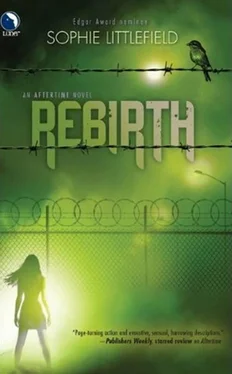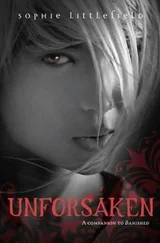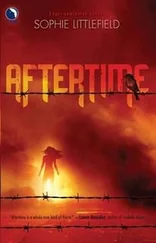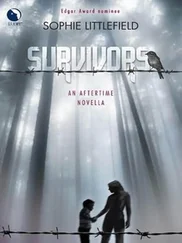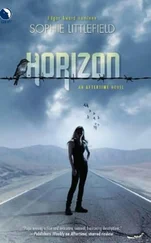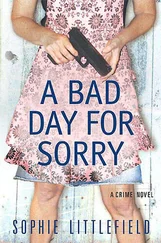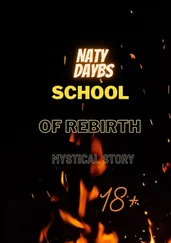The sun had slipped behind the building, casting its courtyard in shadow. The earth was cracked and scabbed despite the recent rains; patches of kaysev, leaf-dead and spindly, caught debris in their rigid stems. A foam cup, a plastic bag, a diaper, dried and desiccated.
The building’s door had disappeared months ago, and inside, the litter hinted at stories of desperation. A torn suitcase spilled matted clothing across the tiled entry, and a stroller was overturned in the corner, its colorful fabric fuzzed with mold.
Cass took the stone steps two at a time, hand over hand on the banister, moving as stealthily as she was able-Cass had the sensation that if she didn’t catch Dor unawares he would simply disappear, would magic himself away to somewhere else entirely. He had that way about him, an elusiveness, and when she rounded the top of the stairs and found herself staring through the wide-flung door into the room Dor had made his own, the sight of him-broad back and hints of a dark, tanned neck, inky black hair reaching almost to his shoulders, motionless in a canvas director’s chair, the rest of the room stark and empty-it only underscored the sense that he was illusory.
Dor heard her and leaped from his chair, going down on one knee with the blade in his hand like an extension of his body, eyes flashing black and bright, and the surreal notion of him grew stronger still.
But then he said her name, and his voice was flat, almost disappointed. He stood slowly, lowering his blade hand, and the mythological strangeness of him began to evaporate. The scar across his forehead was almost invisible in the gloom and his expression was unreadable. The loops of silver that pierced the cartilage of each ear weren’t noticeable, and the coal-black kaysev tattoos running up both arms were covered by his canvas coat. He almost looked like an ordinary man. “What do you want?”
“I’m sorry about Sammi.”
Dor barely acknowledged her words. A faint lift of his chin, that was all. She knew he had decided long ago that his daughter would be safer sheltering at the school than here in the Box with him. Few people knew about Sammi: her very existence was something that could be used against him. So long as his foes believed he cared for nothing and no one, he was invulnerable.
Dor never spoke of her, and neither, by tacit agreement, had Smoke or Cass. If the Rebuilders discovered that they had Dor’s daughter, the entire balance of power shifted, and the Box could be theirs for the price of a single life. Getting her back was key to keeping all of them safe. But Cass knew that Dor wasn’t thinking about strategy now, that his mind was filled only with Sammi, with his fears for her and his rage at her abductors.
Cass pressed on. “Smoke says he’s going.”
“I told him not to,” Dor said, then added in a tone only fractionally less cold, “if that matters to you.”
“And yet he’s going anyway.”
“You want him to stay.”
Cass shrugged. Of course she did…what did he think? She was a woman with a child; Smoke was more than just a body in the night-he was also a layer of safety. It should have gone without saying.
“You think he should stay.” The same question in different words, or something else entirely? Dor did not invite her farther into the room, and she was aware of the space between them, of the still air that was even colder, if that were possible, than outdoors.
“Of course he should stay,” she snapped. She needed him. But what she said instead was: “What can he accomplish? Even if he finds them, if he tracks them down, they’re not going to be alone. They’re not going to be unprepared -”
“Don’t underestimate him,” Dor interrupted. “If I were a betting man, I’d bet on him.”
It was the rock slide, of course. The legend. Three Rebuilders dead, and Smoke untouched, not a hair on his head lost, while the two who fought at his side were dead. It almost didn’t matter that it was true. Cass had heard the story retold a dozen times over a dozen late-night fires and sometimes it was twice that number dead, and sometimes Smoke took a bullet and kept on fighting, and once he had sliced off their ears as trophies and wore them on a cord around his neck.
“He’s just a man,” Cass said bitterly. “Lucky once. No one’s lucky twice, not Aftertime.”
For a long moment neither of them spoke. Then Dor bent and folded his chair carefully and leaned it against the wall, where Cass noticed twin marks in the paint. So, he left the chair in the same place each time. Glancing around the room she saw something she’d missed at first-there was no dust, no dirt. Dor kept this place clean. She wasn’t surprised-anyone could see from his office that he was a fastidious man. She wondered what that said about him, what flaws or virtues it bespoke, what history it maybe whitewashed, and then she put that out of her mind and followed him from the room, a place she suspected she had defiled for him merely by her presence there.
THEY WALKED, EACH OF THEM KEEPING WATCH in the way every citizen had learned to keep watch. It was like breathing after a while: you were only aware of your own constant vigilance when you stopped. By now Cass doubted whether there was anyone alive in California who hadn’t seen a Beater. And seeing one, even once, was enough to change you forever.
“You know about Rolph,” Dor said after a while.
Cass nodded. Everyone knew about Rolph, a quiet man who’d arrived a few weeks back, traded everything in his meager pack for a bottle of cheap rum, drank it fast and stumbled out of the Box at dusk to piss on a wall across the street. For reasons no one would ever know, he wandered the wrong way; even drunk, his screams carried far into the Box half an hour later.
“There’s going to be more like him. A lot more.”
“Some people say it’s going to be better now that the days are getting shorter. You know, because there’s less daylight.”
“Don’t believe it.”
Cass didn’t, though she knew why people clung to that particular hope. In the early stages of the disease, right after the initial fever, the pupils began to shrink, and kept on shrinking until, by the time the thing that used to be human was chewing its own flesh off, those eyes let in only a tiny amount of light. Beaters were blind when the sun went down, clumsy at dawn and dusk. Even at high noon you’d sometimes see them staring up at the sky as though they were trying to absorb all the light they could, as though they couldn’t get enough, as though they would swallow down the entirety of the sun if they could.
On a recent sleepless night, Cass’s restive mind had spun a dream-image of the sun sinking down to the earth. The great golden globe came to rest in a field, and the Beaters stopped what they were doing and ran toward it, throwing themselves at it-at its trillions of watts of light-swarming with the same fevered passion that they attacked the living.
Their hunger was insatiable. A Beater feasting on its victim made sounds of such sensual release that they almost sounded sexual; a Beater denied would throw itself against walls and fences until it bled, unmindful of the pain in its longing and need. In Cass’s dream, the Beaters-all the Beaters in the world-raced toward the light, plunging into the million degrees of the fire, flaming and dying in the ecstasy of their need. They were incinerated to nothing, their bones burned to powder that floated away on brilliant flames, the sun flickering only for a moment before it blazed down again as it had for all time.
If only.
But even then it would not be over. Because as long as the blueleaf strain of kaysev grew, as long as some citizen somewhere mistook the furled and tinted leaves for the ordinary kaysev and ate it, more would be infected, and more would die.
Читать дальше
Конец ознакомительного отрывка
Купить книгу
